Brand Strategy: Impact of Culture and Consumers' Behavior
VerifiedAdded on 2020/10/22
|9
|3089
|187
Essay
AI Summary
This essay explores the multifaceted impact of brands on individual consumers and the influence of culture on brand strategy. The first section delves into how brand identity, ethical implications, and social psychological theories, such as social influence and self-verification, shape consumer behavior and purchasing decisions. It examines the various elements that contribute to a brand's identity, including its concept, values, and customer experience. The second section focuses on the significance of cultural adaptation for global brands, highlighting how brands must navigate diverse cultural landscapes to succeed. It discusses the importance of adapting to local cultures, including language and consumer preferences, to build strong relationships and drive business growth. The essay concludes by emphasizing the critical role of brand management in influencing consumer behavior and achieving long-term business objectives.

ACADEMIC ESSAY
Paraphrase This Document
Need a fresh take? Get an instant paraphrase of this document with our AI Paraphraser

TABLE OF CONTENTS
ESSAY 1 - IMPACT OF BRAND ON INDIVIDUAL CONSUMERS.........................................1
ESSAY 2- IMPACT OF CULTURE ON BRAND STRATEGY...................................................4
REFERENCES................................................................................................................................7
ESSAY 1 - IMPACT OF BRAND ON INDIVIDUAL CONSUMERS.........................................1
ESSAY 2- IMPACT OF CULTURE ON BRAND STRATEGY...................................................4
REFERENCES................................................................................................................................7
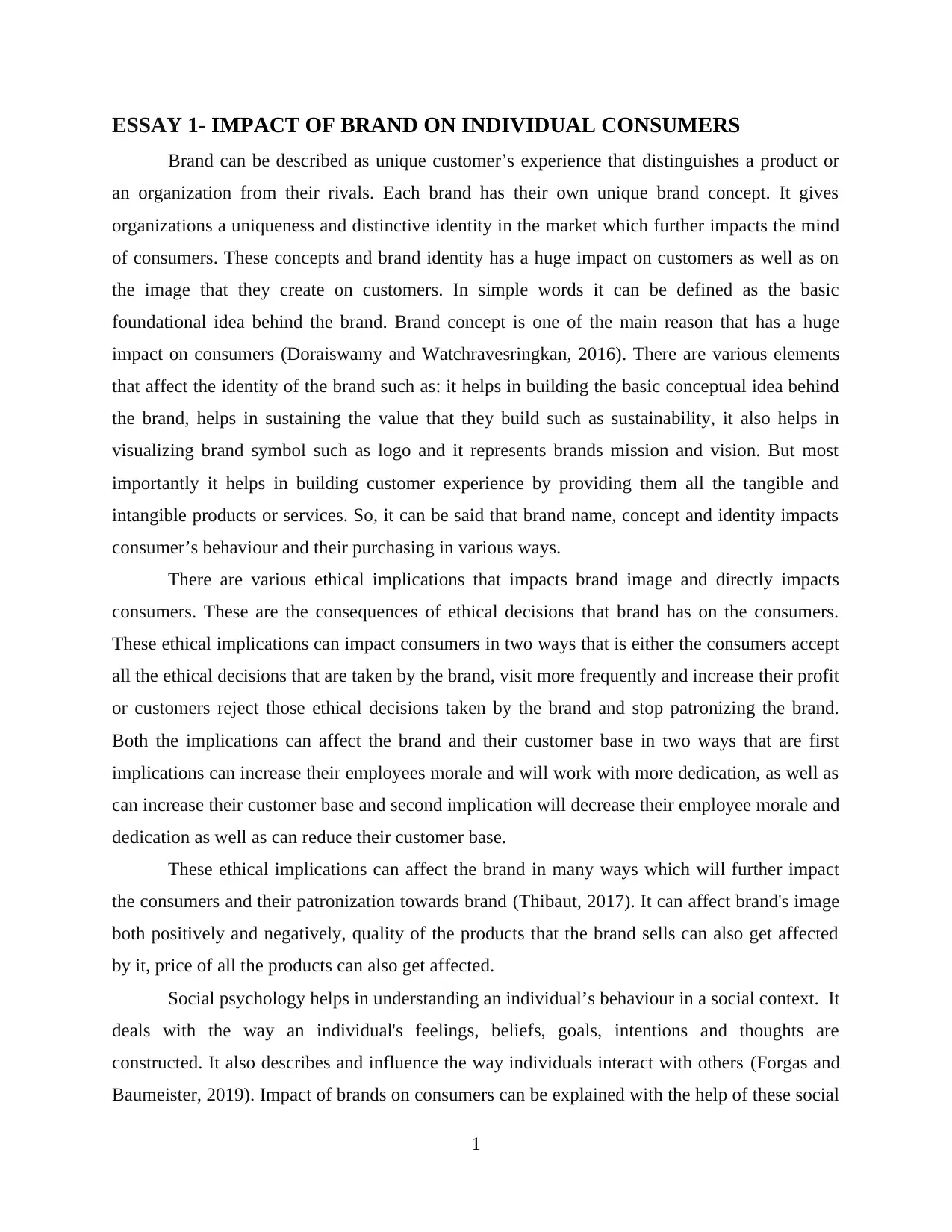
ESSAY 1- IMPACT OF BRAND ON INDIVIDUAL CONSUMERS
Brand can be described as unique customer’s experience that distinguishes a product or
an organization from their rivals. Each brand has their own unique brand concept. It gives
organizations a uniqueness and distinctive identity in the market which further impacts the mind
of consumers. These concepts and brand identity has a huge impact on customers as well as on
the image that they create on customers. In simple words it can be defined as the basic
foundational idea behind the brand. Brand concept is one of the main reason that has a huge
impact on consumers (Doraiswamy and Watchravesringkan, 2016). There are various elements
that affect the identity of the brand such as: it helps in building the basic conceptual idea behind
the brand, helps in sustaining the value that they build such as sustainability, it also helps in
visualizing brand symbol such as logo and it represents brands mission and vision. But most
importantly it helps in building customer experience by providing them all the tangible and
intangible products or services. So, it can be said that brand name, concept and identity impacts
consumer’s behaviour and their purchasing in various ways.
There are various ethical implications that impacts brand image and directly impacts
consumers. These are the consequences of ethical decisions that brand has on the consumers.
These ethical implications can impact consumers in two ways that is either the consumers accept
all the ethical decisions that are taken by the brand, visit more frequently and increase their profit
or customers reject those ethical decisions taken by the brand and stop patronizing the brand.
Both the implications can affect the brand and their customer base in two ways that are first
implications can increase their employees morale and will work with more dedication, as well as
can increase their customer base and second implication will decrease their employee morale and
dedication as well as can reduce their customer base.
These ethical implications can affect the brand in many ways which will further impact
the consumers and their patronization towards brand (Thibaut, 2017). It can affect brand's image
both positively and negatively, quality of the products that the brand sells can also get affected
by it, price of all the products can also get affected.
Social psychology helps in understanding an individual’s behaviour in a social context. It
deals with the way an individual's feelings, beliefs, goals, intentions and thoughts are
constructed. It also describes and influence the way individuals interact with others (Forgas and
Baumeister, 2019). Impact of brands on consumers can be explained with the help of these social
1
Brand can be described as unique customer’s experience that distinguishes a product or
an organization from their rivals. Each brand has their own unique brand concept. It gives
organizations a uniqueness and distinctive identity in the market which further impacts the mind
of consumers. These concepts and brand identity has a huge impact on customers as well as on
the image that they create on customers. In simple words it can be defined as the basic
foundational idea behind the brand. Brand concept is one of the main reason that has a huge
impact on consumers (Doraiswamy and Watchravesringkan, 2016). There are various elements
that affect the identity of the brand such as: it helps in building the basic conceptual idea behind
the brand, helps in sustaining the value that they build such as sustainability, it also helps in
visualizing brand symbol such as logo and it represents brands mission and vision. But most
importantly it helps in building customer experience by providing them all the tangible and
intangible products or services. So, it can be said that brand name, concept and identity impacts
consumer’s behaviour and their purchasing in various ways.
There are various ethical implications that impacts brand image and directly impacts
consumers. These are the consequences of ethical decisions that brand has on the consumers.
These ethical implications can impact consumers in two ways that is either the consumers accept
all the ethical decisions that are taken by the brand, visit more frequently and increase their profit
or customers reject those ethical decisions taken by the brand and stop patronizing the brand.
Both the implications can affect the brand and their customer base in two ways that are first
implications can increase their employees morale and will work with more dedication, as well as
can increase their customer base and second implication will decrease their employee morale and
dedication as well as can reduce their customer base.
These ethical implications can affect the brand in many ways which will further impact
the consumers and their patronization towards brand (Thibaut, 2017). It can affect brand's image
both positively and negatively, quality of the products that the brand sells can also get affected
by it, price of all the products can also get affected.
Social psychology helps in understanding an individual’s behaviour in a social context. It
deals with the way an individual's feelings, beliefs, goals, intentions and thoughts are
constructed. It also describes and influence the way individuals interact with others (Forgas and
Baumeister, 2019). Impact of brands on consumers can be explained with the help of these social
1
⊘ This is a preview!⊘
Do you want full access?
Subscribe today to unlock all pages.

Trusted by 1+ million students worldwide
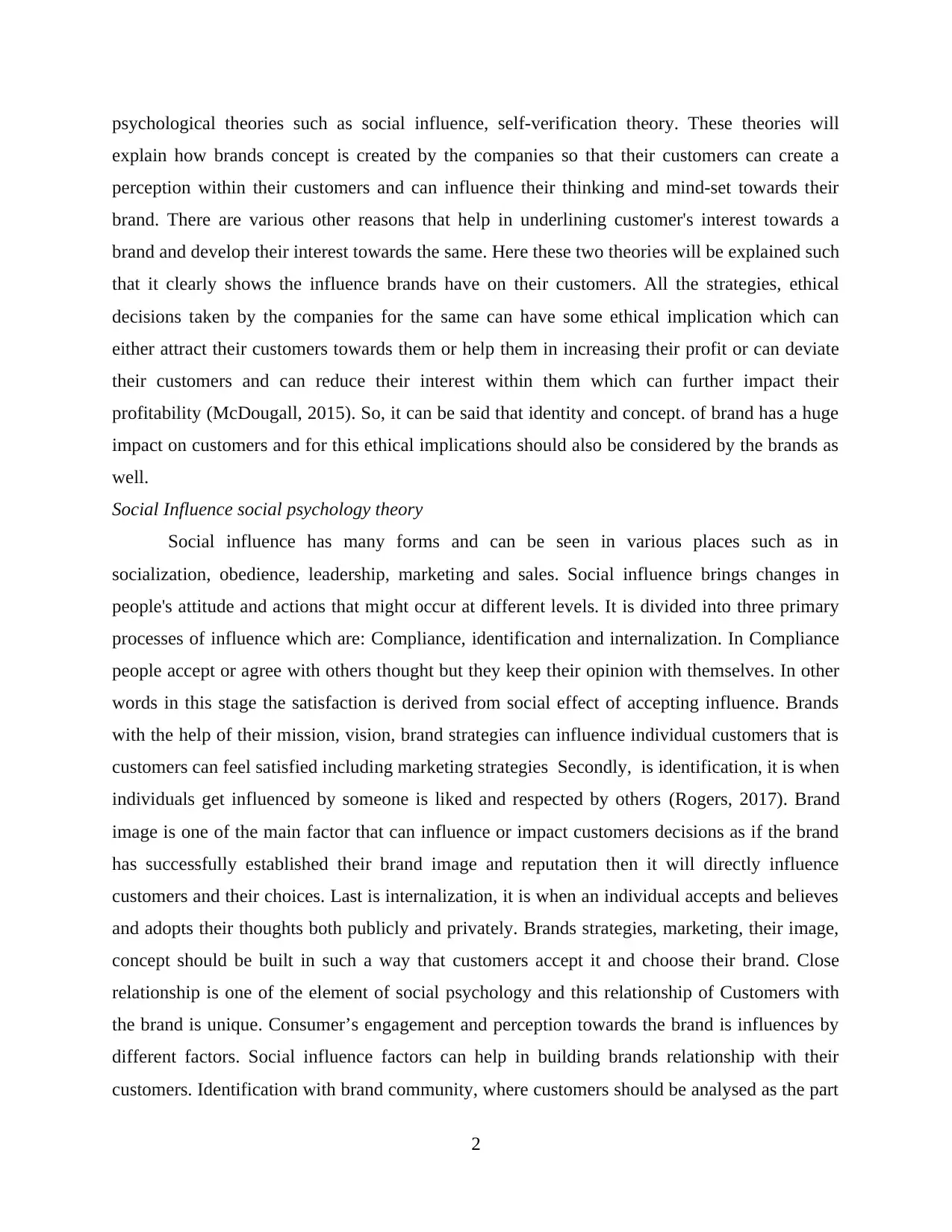
psychological theories such as social influence, self-verification theory. These theories will
explain how brands concept is created by the companies so that their customers can create a
perception within their customers and can influence their thinking and mind-set towards their
brand. There are various other reasons that help in underlining customer's interest towards a
brand and develop their interest towards the same. Here these two theories will be explained such
that it clearly shows the influence brands have on their customers. All the strategies, ethical
decisions taken by the companies for the same can have some ethical implication which can
either attract their customers towards them or help them in increasing their profit or can deviate
their customers and can reduce their interest within them which can further impact their
profitability (McDougall, 2015). So, it can be said that identity and concept. of brand has a huge
impact on customers and for this ethical implications should also be considered by the brands as
well.
Social Influence social psychology theory
Social influence has many forms and can be seen in various places such as in
socialization, obedience, leadership, marketing and sales. Social influence brings changes in
people's attitude and actions that might occur at different levels. It is divided into three primary
processes of influence which are: Compliance, identification and internalization. In Compliance
people accept or agree with others thought but they keep their opinion with themselves. In other
words in this stage the satisfaction is derived from social effect of accepting influence. Brands
with the help of their mission, vision, brand strategies can influence individual customers that is
customers can feel satisfied including marketing strategies Secondly, is identification, it is when
individuals get influenced by someone is liked and respected by others (Rogers, 2017). Brand
image is one of the main factor that can influence or impact customers decisions as if the brand
has successfully established their brand image and reputation then it will directly influence
customers and their choices. Last is internalization, it is when an individual accepts and believes
and adopts their thoughts both publicly and privately. Brands strategies, marketing, their image,
concept should be built in such a way that customers accept it and choose their brand. Close
relationship is one of the element of social psychology and this relationship of Customers with
the brand is unique. Consumer’s engagement and perception towards the brand is influences by
different factors. Social influence factors can help in building brands relationship with their
customers. Identification with brand community, where customers should be analysed as the part
2
explain how brands concept is created by the companies so that their customers can create a
perception within their customers and can influence their thinking and mind-set towards their
brand. There are various other reasons that help in underlining customer's interest towards a
brand and develop their interest towards the same. Here these two theories will be explained such
that it clearly shows the influence brands have on their customers. All the strategies, ethical
decisions taken by the companies for the same can have some ethical implication which can
either attract their customers towards them or help them in increasing their profit or can deviate
their customers and can reduce their interest within them which can further impact their
profitability (McDougall, 2015). So, it can be said that identity and concept. of brand has a huge
impact on customers and for this ethical implications should also be considered by the brands as
well.
Social Influence social psychology theory
Social influence has many forms and can be seen in various places such as in
socialization, obedience, leadership, marketing and sales. Social influence brings changes in
people's attitude and actions that might occur at different levels. It is divided into three primary
processes of influence which are: Compliance, identification and internalization. In Compliance
people accept or agree with others thought but they keep their opinion with themselves. In other
words in this stage the satisfaction is derived from social effect of accepting influence. Brands
with the help of their mission, vision, brand strategies can influence individual customers that is
customers can feel satisfied including marketing strategies Secondly, is identification, it is when
individuals get influenced by someone is liked and respected by others (Rogers, 2017). Brand
image is one of the main factor that can influence or impact customers decisions as if the brand
has successfully established their brand image and reputation then it will directly influence
customers and their choices. Last is internalization, it is when an individual accepts and believes
and adopts their thoughts both publicly and privately. Brands strategies, marketing, their image,
concept should be built in such a way that customers accept it and choose their brand. Close
relationship is one of the element of social psychology and this relationship of Customers with
the brand is unique. Consumer’s engagement and perception towards the brand is influences by
different factors. Social influence factors can help in building brands relationship with their
customers. Identification with brand community, where customers should be analysed as the part
2
Paraphrase This Document
Need a fresh take? Get an instant paraphrase of this document with our AI Paraphraser
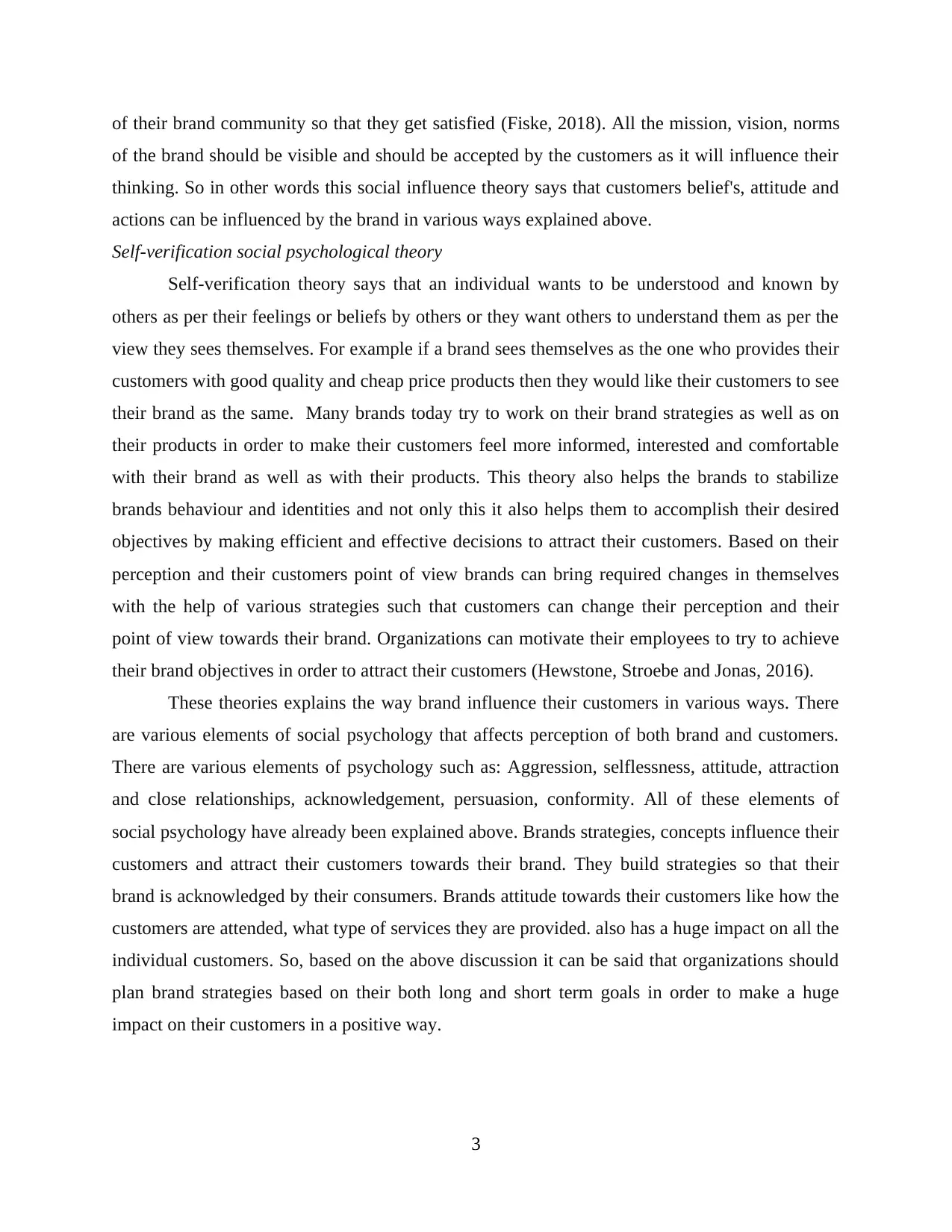
of their brand community so that they get satisfied (Fiske, 2018). All the mission, vision, norms
of the brand should be visible and should be accepted by the customers as it will influence their
thinking. So in other words this social influence theory says that customers belief's, attitude and
actions can be influenced by the brand in various ways explained above.
Self-verification social psychological theory
Self-verification theory says that an individual wants to be understood and known by
others as per their feelings or beliefs by others or they want others to understand them as per the
view they sees themselves. For example if a brand sees themselves as the one who provides their
customers with good quality and cheap price products then they would like their customers to see
their brand as the same. Many brands today try to work on their brand strategies as well as on
their products in order to make their customers feel more informed, interested and comfortable
with their brand as well as with their products. This theory also helps the brands to stabilize
brands behaviour and identities and not only this it also helps them to accomplish their desired
objectives by making efficient and effective decisions to attract their customers. Based on their
perception and their customers point of view brands can bring required changes in themselves
with the help of various strategies such that customers can change their perception and their
point of view towards their brand. Organizations can motivate their employees to try to achieve
their brand objectives in order to attract their customers (Hewstone, Stroebe and Jonas, 2016).
These theories explains the way brand influence their customers in various ways. There
are various elements of social psychology that affects perception of both brand and customers.
There are various elements of psychology such as: Aggression, selflessness, attitude, attraction
and close relationships, acknowledgement, persuasion, conformity. All of these elements of
social psychology have already been explained above. Brands strategies, concepts influence their
customers and attract their customers towards their brand. They build strategies so that their
brand is acknowledged by their consumers. Brands attitude towards their customers like how the
customers are attended, what type of services they are provided. also has a huge impact on all the
individual customers. So, based on the above discussion it can be said that organizations should
plan brand strategies based on their both long and short term goals in order to make a huge
impact on their customers in a positive way.
3
of the brand should be visible and should be accepted by the customers as it will influence their
thinking. So in other words this social influence theory says that customers belief's, attitude and
actions can be influenced by the brand in various ways explained above.
Self-verification social psychological theory
Self-verification theory says that an individual wants to be understood and known by
others as per their feelings or beliefs by others or they want others to understand them as per the
view they sees themselves. For example if a brand sees themselves as the one who provides their
customers with good quality and cheap price products then they would like their customers to see
their brand as the same. Many brands today try to work on their brand strategies as well as on
their products in order to make their customers feel more informed, interested and comfortable
with their brand as well as with their products. This theory also helps the brands to stabilize
brands behaviour and identities and not only this it also helps them to accomplish their desired
objectives by making efficient and effective decisions to attract their customers. Based on their
perception and their customers point of view brands can bring required changes in themselves
with the help of various strategies such that customers can change their perception and their
point of view towards their brand. Organizations can motivate their employees to try to achieve
their brand objectives in order to attract their customers (Hewstone, Stroebe and Jonas, 2016).
These theories explains the way brand influence their customers in various ways. There
are various elements of social psychology that affects perception of both brand and customers.
There are various elements of psychology such as: Aggression, selflessness, attitude, attraction
and close relationships, acknowledgement, persuasion, conformity. All of these elements of
social psychology have already been explained above. Brands strategies, concepts influence their
customers and attract their customers towards their brand. They build strategies so that their
brand is acknowledged by their consumers. Brands attitude towards their customers like how the
customers are attended, what type of services they are provided. also has a huge impact on all the
individual customers. So, based on the above discussion it can be said that organizations should
plan brand strategies based on their both long and short term goals in order to make a huge
impact on their customers in a positive way.
3
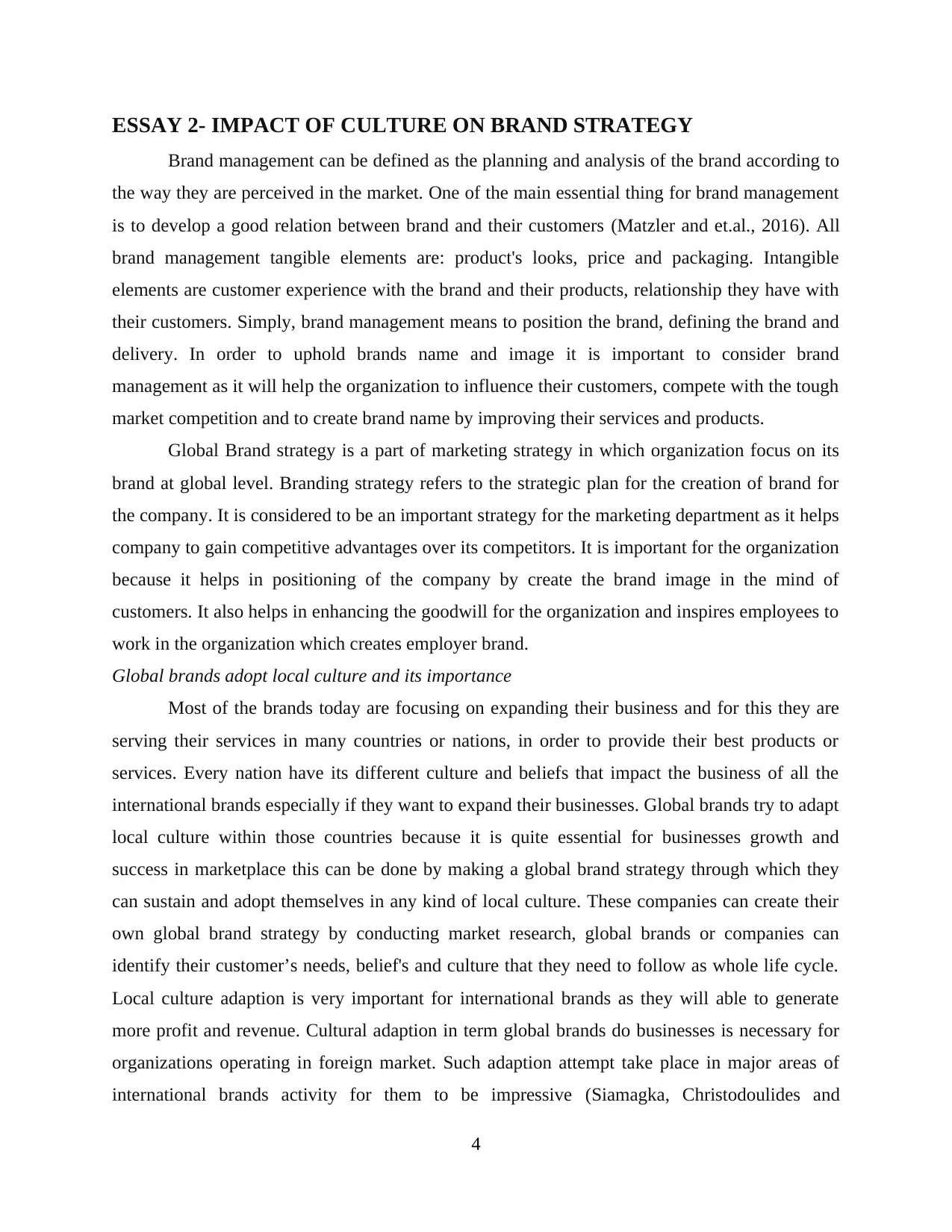
ESSAY 2- IMPACT OF CULTURE ON BRAND STRATEGY
Brand management can be defined as the planning and analysis of the brand according to
the way they are perceived in the market. One of the main essential thing for brand management
is to develop a good relation between brand and their customers (Matzler and et.al., 2016). All
brand management tangible elements are: product's looks, price and packaging. Intangible
elements are customer experience with the brand and their products, relationship they have with
their customers. Simply, brand management means to position the brand, defining the brand and
delivery. In order to uphold brands name and image it is important to consider brand
management as it will help the organization to influence their customers, compete with the tough
market competition and to create brand name by improving their services and products.
Global Brand strategy is a part of marketing strategy in which organization focus on its
brand at global level. Branding strategy refers to the strategic plan for the creation of brand for
the company. It is considered to be an important strategy for the marketing department as it helps
company to gain competitive advantages over its competitors. It is important for the organization
because it helps in positioning of the company by create the brand image in the mind of
customers. It also helps in enhancing the goodwill for the organization and inspires employees to
work in the organization which creates employer brand.
Global brands adopt local culture and its importance
Most of the brands today are focusing on expanding their business and for this they are
serving their services in many countries or nations, in order to provide their best products or
services. Every nation have its different culture and beliefs that impact the business of all the
international brands especially if they want to expand their businesses. Global brands try to adapt
local culture within those countries because it is quite essential for businesses growth and
success in marketplace this can be done by making a global brand strategy through which they
can sustain and adopt themselves in any kind of local culture. These companies can create their
own global brand strategy by conducting market research, global brands or companies can
identify their customer’s needs, belief's and culture that they need to follow as whole life cycle.
Local culture adaption is very important for international brands as they will able to generate
more profit and revenue. Cultural adaption in term global brands do businesses is necessary for
organizations operating in foreign market. Such adaption attempt take place in major areas of
international brands activity for them to be impressive (Siamagka, Christodoulides and
4
Brand management can be defined as the planning and analysis of the brand according to
the way they are perceived in the market. One of the main essential thing for brand management
is to develop a good relation between brand and their customers (Matzler and et.al., 2016). All
brand management tangible elements are: product's looks, price and packaging. Intangible
elements are customer experience with the brand and their products, relationship they have with
their customers. Simply, brand management means to position the brand, defining the brand and
delivery. In order to uphold brands name and image it is important to consider brand
management as it will help the organization to influence their customers, compete with the tough
market competition and to create brand name by improving their services and products.
Global Brand strategy is a part of marketing strategy in which organization focus on its
brand at global level. Branding strategy refers to the strategic plan for the creation of brand for
the company. It is considered to be an important strategy for the marketing department as it helps
company to gain competitive advantages over its competitors. It is important for the organization
because it helps in positioning of the company by create the brand image in the mind of
customers. It also helps in enhancing the goodwill for the organization and inspires employees to
work in the organization which creates employer brand.
Global brands adopt local culture and its importance
Most of the brands today are focusing on expanding their business and for this they are
serving their services in many countries or nations, in order to provide their best products or
services. Every nation have its different culture and beliefs that impact the business of all the
international brands especially if they want to expand their businesses. Global brands try to adapt
local culture within those countries because it is quite essential for businesses growth and
success in marketplace this can be done by making a global brand strategy through which they
can sustain and adopt themselves in any kind of local culture. These companies can create their
own global brand strategy by conducting market research, global brands or companies can
identify their customer’s needs, belief's and culture that they need to follow as whole life cycle.
Local culture adaption is very important for international brands as they will able to generate
more profit and revenue. Cultural adaption in term global brands do businesses is necessary for
organizations operating in foreign market. Such adaption attempt take place in major areas of
international brands activity for them to be impressive (Siamagka, Christodoulides and
4
⊘ This is a preview!⊘
Do you want full access?
Subscribe today to unlock all pages.

Trusted by 1+ million students worldwide
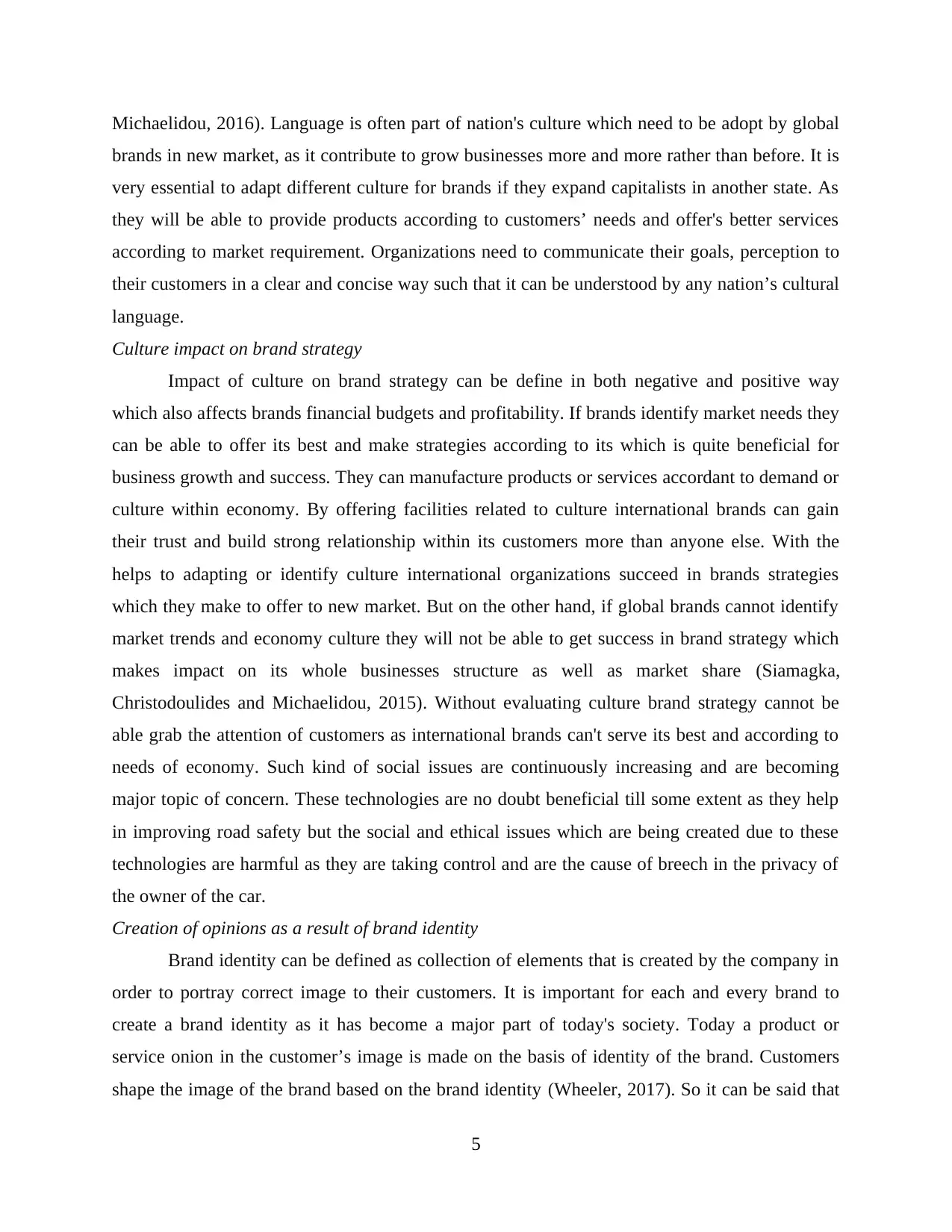
Michaelidou, 2016). Language is often part of nation's culture which need to be adopt by global
brands in new market, as it contribute to grow businesses more and more rather than before. It is
very essential to adapt different culture for brands if they expand capitalists in another state. As
they will be able to provide products according to customers’ needs and offer's better services
according to market requirement. Organizations need to communicate their goals, perception to
their customers in a clear and concise way such that it can be understood by any nation’s cultural
language.
Culture impact on brand strategy
Impact of culture on brand strategy can be define in both negative and positive way
which also affects brands financial budgets and profitability. If brands identify market needs they
can be able to offer its best and make strategies according to its which is quite beneficial for
business growth and success. They can manufacture products or services accordant to demand or
culture within economy. By offering facilities related to culture international brands can gain
their trust and build strong relationship within its customers more than anyone else. With the
helps to adapting or identify culture international organizations succeed in brands strategies
which they make to offer to new market. But on the other hand, if global brands cannot identify
market trends and economy culture they will not be able to get success in brand strategy which
makes impact on its whole businesses structure as well as market share (Siamagka,
Christodoulides and Michaelidou, 2015). Without evaluating culture brand strategy cannot be
able grab the attention of customers as international brands can't serve its best and according to
needs of economy. Such kind of social issues are continuously increasing and are becoming
major topic of concern. These technologies are no doubt beneficial till some extent as they help
in improving road safety but the social and ethical issues which are being created due to these
technologies are harmful as they are taking control and are the cause of breech in the privacy of
the owner of the car.
Creation of opinions as a result of brand identity
Brand identity can be defined as collection of elements that is created by the company in
order to portray correct image to their customers. It is important for each and every brand to
create a brand identity as it has become a major part of today's society. Today a product or
service onion in the customer’s image is made on the basis of identity of the brand. Customers
shape the image of the brand based on the brand identity (Wheeler, 2017). So it can be said that
5
brands in new market, as it contribute to grow businesses more and more rather than before. It is
very essential to adapt different culture for brands if they expand capitalists in another state. As
they will be able to provide products according to customers’ needs and offer's better services
according to market requirement. Organizations need to communicate their goals, perception to
their customers in a clear and concise way such that it can be understood by any nation’s cultural
language.
Culture impact on brand strategy
Impact of culture on brand strategy can be define in both negative and positive way
which also affects brands financial budgets and profitability. If brands identify market needs they
can be able to offer its best and make strategies according to its which is quite beneficial for
business growth and success. They can manufacture products or services accordant to demand or
culture within economy. By offering facilities related to culture international brands can gain
their trust and build strong relationship within its customers more than anyone else. With the
helps to adapting or identify culture international organizations succeed in brands strategies
which they make to offer to new market. But on the other hand, if global brands cannot identify
market trends and economy culture they will not be able to get success in brand strategy which
makes impact on its whole businesses structure as well as market share (Siamagka,
Christodoulides and Michaelidou, 2015). Without evaluating culture brand strategy cannot be
able grab the attention of customers as international brands can't serve its best and according to
needs of economy. Such kind of social issues are continuously increasing and are becoming
major topic of concern. These technologies are no doubt beneficial till some extent as they help
in improving road safety but the social and ethical issues which are being created due to these
technologies are harmful as they are taking control and are the cause of breech in the privacy of
the owner of the car.
Creation of opinions as a result of brand identity
Brand identity can be defined as collection of elements that is created by the company in
order to portray correct image to their customers. It is important for each and every brand to
create a brand identity as it has become a major part of today's society. Today a product or
service onion in the customer’s image is made on the basis of identity of the brand. Customers
shape the image of the brand based on the brand identity (Wheeler, 2017). So it can be said that
5
Paraphrase This Document
Need a fresh take? Get an instant paraphrase of this document with our AI Paraphraser
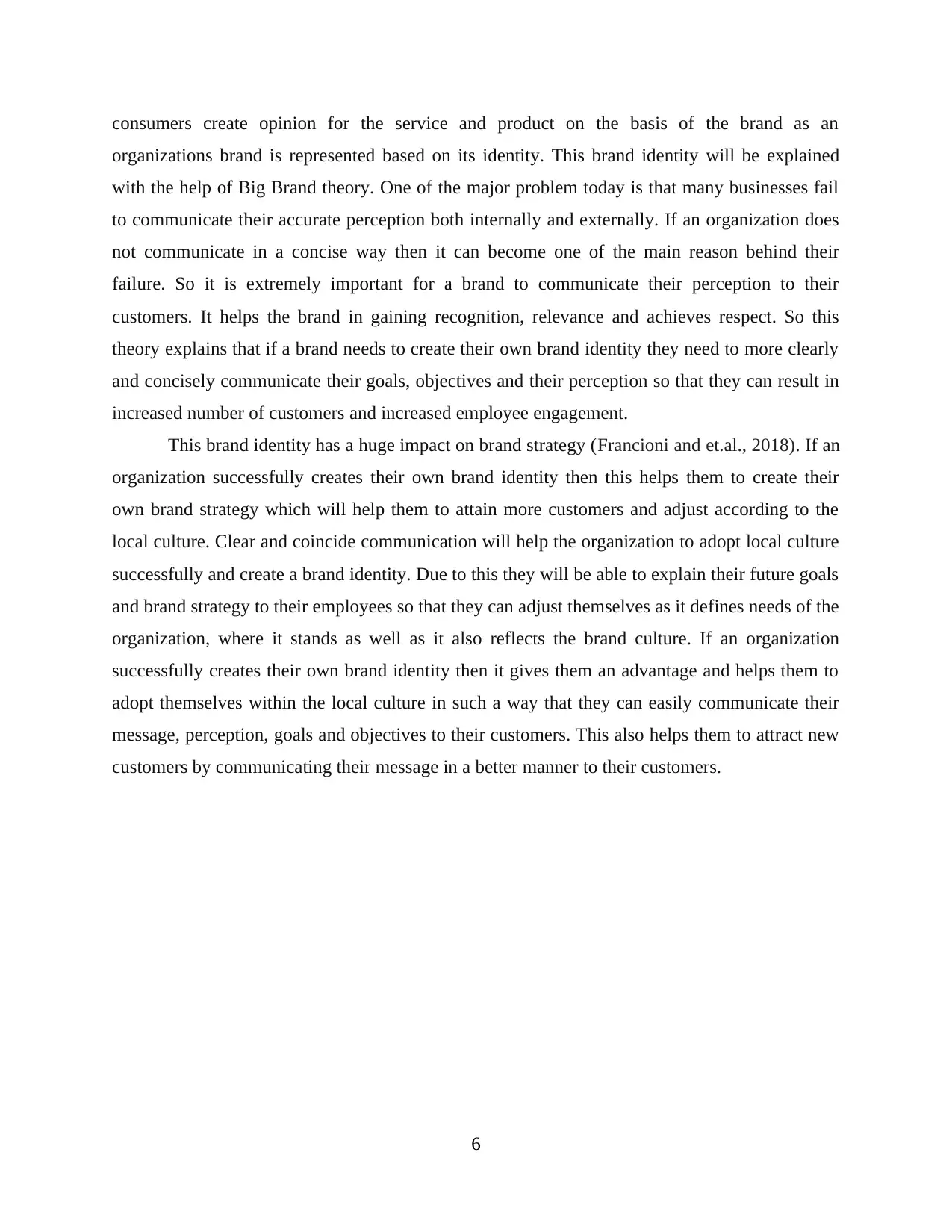
consumers create opinion for the service and product on the basis of the brand as an
organizations brand is represented based on its identity. This brand identity will be explained
with the help of Big Brand theory. One of the major problem today is that many businesses fail
to communicate their accurate perception both internally and externally. If an organization does
not communicate in a concise way then it can become one of the main reason behind their
failure. So it is extremely important for a brand to communicate their perception to their
customers. It helps the brand in gaining recognition, relevance and achieves respect. So this
theory explains that if a brand needs to create their own brand identity they need to more clearly
and concisely communicate their goals, objectives and their perception so that they can result in
increased number of customers and increased employee engagement.
This brand identity has a huge impact on brand strategy (Francioni and et.al., 2018). If an
organization successfully creates their own brand identity then this helps them to create their
own brand strategy which will help them to attain more customers and adjust according to the
local culture. Clear and coincide communication will help the organization to adopt local culture
successfully and create a brand identity. Due to this they will be able to explain their future goals
and brand strategy to their employees so that they can adjust themselves as it defines needs of the
organization, where it stands as well as it also reflects the brand culture. If an organization
successfully creates their own brand identity then it gives them an advantage and helps them to
adopt themselves within the local culture in such a way that they can easily communicate their
message, perception, goals and objectives to their customers. This also helps them to attract new
customers by communicating their message in a better manner to their customers.
6
organizations brand is represented based on its identity. This brand identity will be explained
with the help of Big Brand theory. One of the major problem today is that many businesses fail
to communicate their accurate perception both internally and externally. If an organization does
not communicate in a concise way then it can become one of the main reason behind their
failure. So it is extremely important for a brand to communicate their perception to their
customers. It helps the brand in gaining recognition, relevance and achieves respect. So this
theory explains that if a brand needs to create their own brand identity they need to more clearly
and concisely communicate their goals, objectives and their perception so that they can result in
increased number of customers and increased employee engagement.
This brand identity has a huge impact on brand strategy (Francioni and et.al., 2018). If an
organization successfully creates their own brand identity then this helps them to create their
own brand strategy which will help them to attain more customers and adjust according to the
local culture. Clear and coincide communication will help the organization to adopt local culture
successfully and create a brand identity. Due to this they will be able to explain their future goals
and brand strategy to their employees so that they can adjust themselves as it defines needs of the
organization, where it stands as well as it also reflects the brand culture. If an organization
successfully creates their own brand identity then it gives them an advantage and helps them to
adopt themselves within the local culture in such a way that they can easily communicate their
message, perception, goals and objectives to their customers. This also helps them to attract new
customers by communicating their message in a better manner to their customers.
6
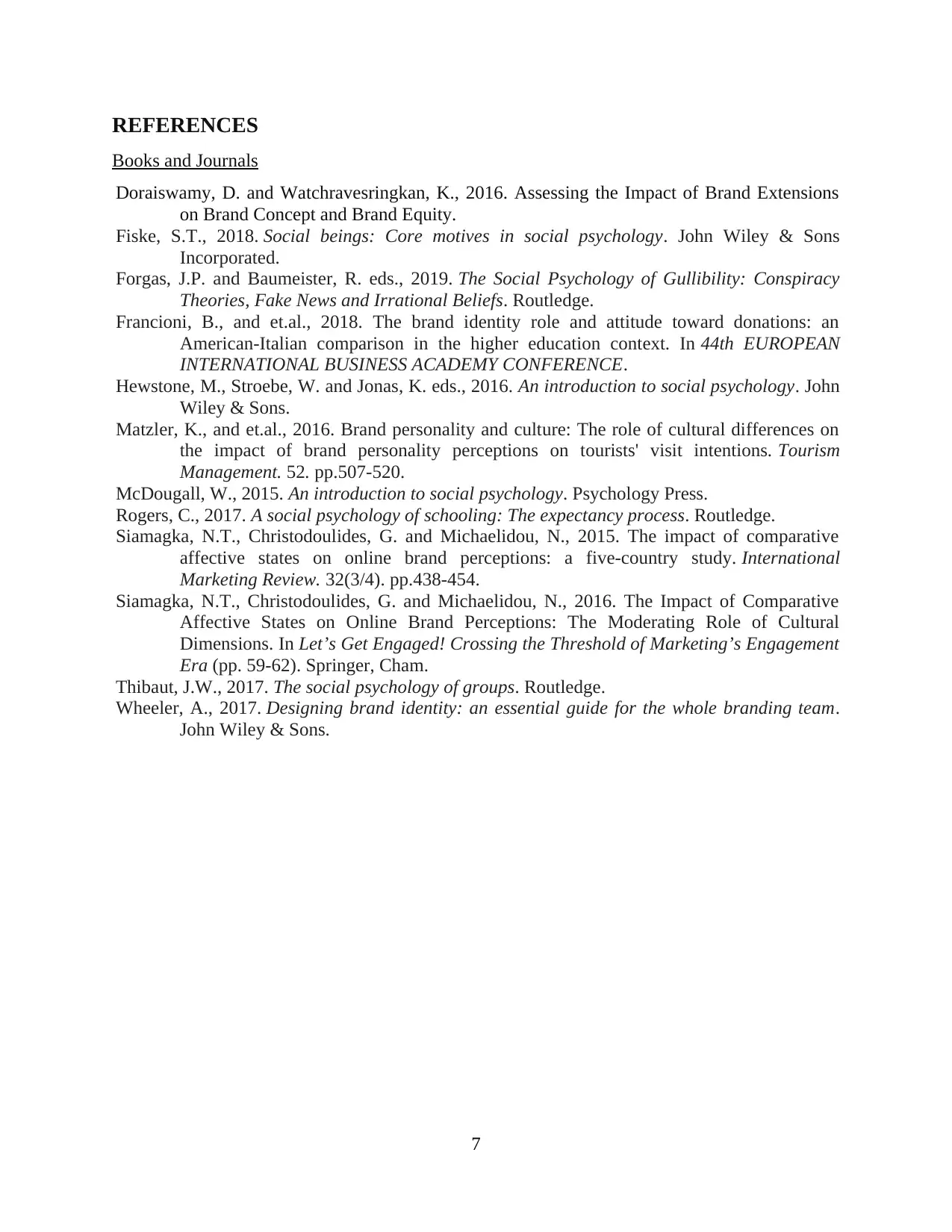
REFERENCES
Books and Journals
Doraiswamy, D. and Watchravesringkan, K., 2016. Assessing the Impact of Brand Extensions
on Brand Concept and Brand Equity.
Fiske, S.T., 2018. Social beings: Core motives in social psychology. John Wiley & Sons
Incorporated.
Forgas, J.P. and Baumeister, R. eds., 2019. The Social Psychology of Gullibility: Conspiracy
Theories, Fake News and Irrational Beliefs. Routledge.
Francioni, B., and et.al., 2018. The brand identity role and attitude toward donations: an
American-Italian comparison in the higher education context. In 44th EUROPEAN
INTERNATIONAL BUSINESS ACADEMY CONFERENCE.
Hewstone, M., Stroebe, W. and Jonas, K. eds., 2016. An introduction to social psychology. John
Wiley & Sons.
Matzler, K., and et.al., 2016. Brand personality and culture: The role of cultural differences on
the impact of brand personality perceptions on tourists' visit intentions. Tourism
Management. 52. pp.507-520.
McDougall, W., 2015. An introduction to social psychology. Psychology Press.
Rogers, C., 2017. A social psychology of schooling: The expectancy process. Routledge.
Siamagka, N.T., Christodoulides, G. and Michaelidou, N., 2015. The impact of comparative
affective states on online brand perceptions: a five-country study. International
Marketing Review. 32(3/4). pp.438-454.
Siamagka, N.T., Christodoulides, G. and Michaelidou, N., 2016. The Impact of Comparative
Affective States on Online Brand Perceptions: The Moderating Role of Cultural
Dimensions. In Let’s Get Engaged! Crossing the Threshold of Marketing’s Engagement
Era (pp. 59-62). Springer, Cham.
Thibaut, J.W., 2017. The social psychology of groups. Routledge.
Wheeler, A., 2017. Designing brand identity: an essential guide for the whole branding team.
John Wiley & Sons.
7
Books and Journals
Doraiswamy, D. and Watchravesringkan, K., 2016. Assessing the Impact of Brand Extensions
on Brand Concept and Brand Equity.
Fiske, S.T., 2018. Social beings: Core motives in social psychology. John Wiley & Sons
Incorporated.
Forgas, J.P. and Baumeister, R. eds., 2019. The Social Psychology of Gullibility: Conspiracy
Theories, Fake News and Irrational Beliefs. Routledge.
Francioni, B., and et.al., 2018. The brand identity role and attitude toward donations: an
American-Italian comparison in the higher education context. In 44th EUROPEAN
INTERNATIONAL BUSINESS ACADEMY CONFERENCE.
Hewstone, M., Stroebe, W. and Jonas, K. eds., 2016. An introduction to social psychology. John
Wiley & Sons.
Matzler, K., and et.al., 2016. Brand personality and culture: The role of cultural differences on
the impact of brand personality perceptions on tourists' visit intentions. Tourism
Management. 52. pp.507-520.
McDougall, W., 2015. An introduction to social psychology. Psychology Press.
Rogers, C., 2017. A social psychology of schooling: The expectancy process. Routledge.
Siamagka, N.T., Christodoulides, G. and Michaelidou, N., 2015. The impact of comparative
affective states on online brand perceptions: a five-country study. International
Marketing Review. 32(3/4). pp.438-454.
Siamagka, N.T., Christodoulides, G. and Michaelidou, N., 2016. The Impact of Comparative
Affective States on Online Brand Perceptions: The Moderating Role of Cultural
Dimensions. In Let’s Get Engaged! Crossing the Threshold of Marketing’s Engagement
Era (pp. 59-62). Springer, Cham.
Thibaut, J.W., 2017. The social psychology of groups. Routledge.
Wheeler, A., 2017. Designing brand identity: an essential guide for the whole branding team.
John Wiley & Sons.
7
⊘ This is a preview!⊘
Do you want full access?
Subscribe today to unlock all pages.

Trusted by 1+ million students worldwide
1 out of 9
Related Documents
Your All-in-One AI-Powered Toolkit for Academic Success.
+13062052269
info@desklib.com
Available 24*7 on WhatsApp / Email
![[object Object]](/_next/static/media/star-bottom.7253800d.svg)
Unlock your academic potential
Copyright © 2020–2026 A2Z Services. All Rights Reserved. Developed and managed by ZUCOL.





